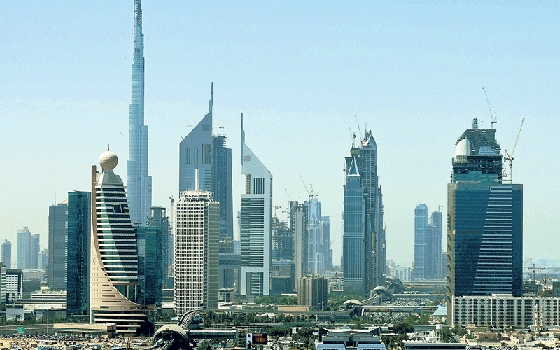Dubai's government is expecting to run a balanced budget in 2015, even as it increases spending by 9 percent compared with a year earlier, an official statement said.
The no-deficit budget would be Dubai's first in the six years since the global financial crisis. It reflects strong local economic growth coupled with a boost in expected revenues from taxes and real-estate transaction fees, according to a statement on Saturday carried by the official WAM news agency.
A semiautonomous member of the United Arab Emirates, Dubai's rise in fortunes comes as the Persian Gulf business hub enjoys an economic resurgence. Real estate prices have registered double-digit rises in the past two years after plummeting in the aftermath of the crisis in 2009, although the pace of growth has slowed in recent quarters.
Trade and tourism have also provided a lift for Dubai, which unlike its neighbors doesn't have large oil and gas reserves. The local economy was on track to grow by more than 5 percent in 2014, according to a forecast by the Institute of International Finance last year.
Dubai raised targeted spending in its 2015 budget to 41 billion dirhams ($11.17 billion), up 9 percent compared with last year, the statement said. Of that, 37 percent was earmarked for salaries and 2,530 new jobs for citizens, it said. Infrastructure development was to get 13 percent of the spending total, while the remainder was for administrative expenses, capital expenditure, grants and debt service.
Revenues, meanwhile, were expected to rise by 11 percent compared with last year to 41 billion dirhams due to "remarkable real economic growth" as well as increases in fees for government services, the statement said. In late 2013, Dubai doubled the fees it charges on real-estate transactions to 4 percent, boosting state revenues amid the market's rapid recovery.
Oil revenues represented just 4 percent of anticipated government revenues, the statement said.
While projected revenues and spending were equal, Dubai expected to run a 3.6 billion dirhams operating surplus, the statement said. That represents the amount by which recurring revenues are expected to exceed recurring expenses.
Before 2015, Dubai last projected a surplus in 2008, when revenues were seen exceeding expenditures by 11.4 billion dirhams.
Projected deficits hit a high point in 2010, when the government's anticipated shortfall was 6 billion dirhams. Dubai trimmed that deficit steadily in subsequent years, limiting spending growth and trying to increase revenues.
The Saudi Gazette
5 January













































































